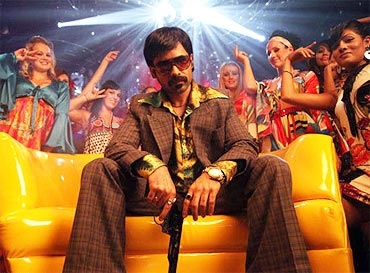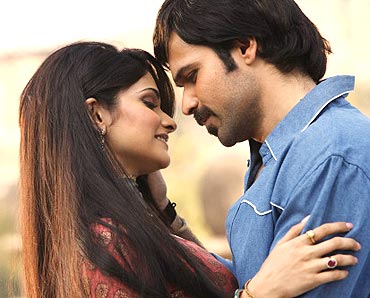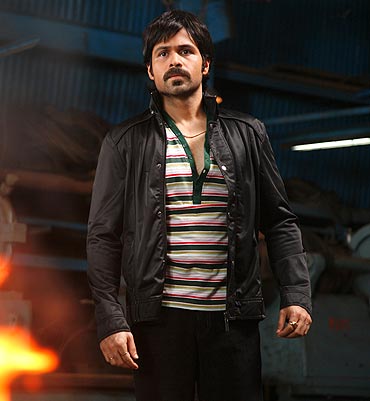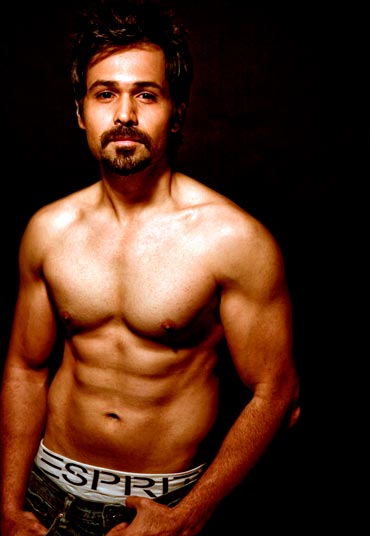 | « Back to article | Print this article |
'I don't like the term 'six packs''
In his next film, Emraan Hashmi will venture out of the Bhatt camp, and essay a role he has never played before -- an upcoming don.
Milan Luthria's Once Upon A Time In Mumbaai apparently traces the lives of underworld kingpins Haji Mastan and Dawood Ibrahim, and stars an ensemble cast of Ajay Devgn, Hashmi, Kangna Ranaut and Prachi Desai.
Emraan tells Nithya Ramani what to expect.
You play an upcoming don in this film, something you have never played before. What can we expect from your character?
The story is how the underworld evolved in Mumbai in the 1960s and 1970s. It is the story about two men -- Sultan, who is ruling Mumbai at that time and my character Shoaib, who is on his way up. Shoaib is a wild child; he's crazy and erratic. He has no ethics.
It is a story about their friendship and eventually, their rivalry.
Milan hasn't made me the cliched underworld guy in this film. He hasn't made it dark and grim. He has added his own flair of romance and humour. I liked that take about the film, the way he has changed the way we look at underworld films.
Is that what made you sign up for the film?
When Milan came to my place a year and a half back, he didn't have a script. He just gave me a five minute narration. I had heard many underworld films [script narrations] but this was something new. It was risky because they were trying to break new ground. That's why I signed up. That five minute narration got me on board.
After 20 days, I got the screenplay. I was blown away.
'Once Upon a Time in Mumbaai is a romanticized version of how the underworld was back then'
Why is the film set in the 1960s and 1970s?
Milan wanted to show how crime evolved in Mumbai, and that was the time when crime shot up due to smuggling. Then it increased slowly, and changed the whole scenario.
I heard that this world had a cool factor. It was intriguing for guys to be a part of the underworld. This lasted till the 1990s when the underworld suddenly acquired a religious tone with the riots and bomb blasts. Then it became ugly.
Once Upon a Time in Mumbaai is a romanticized version of how the underworld was back then.
What makes Milan Luthria's gangster film different from films shot by other directors like Ram Gopal Varma?
Ram Gopal Varma's films enter a very dark space. Milan has made his characters more believable. He shows that criminals can have a sense of humour, that they can get afraid, fall in love, and get vulnerable at times. We don't see that in other underworld films.
Women don't like watching dark and gloomy films. We have tried to get a whole new audience to the theatres.
This film also has a sense of nostalgia for people of that era -- like my parents. They can relive those days.
'I prefer white t-shirt and blue jeans'
This is your first film outside the Bhatt camp.
No, this is not the first time. But this is the first time another big banner is producing my film.
Ekta [Kapoor] is a great producer. The kind of conviction she has in a film she likes is tremendous. She doesn't mind spending money as long as she believes in it.
She doesn't come to the sets, yet she is a guiding force. She gives the director his space.
What was working with Milan Luthria like?
We had done a lot of pre-production work before we started shooting. There were lots of workshops and discussions on Shoaib's looks, dialogue delivery and body language. Milan had made a chart on each character -- like what does Shoaib eat, what does he wear, where does he go first thing in the morning... These may not be scenes in the film but he likes to go to that depth to know the character better.
I was surprised to know that I had to wear bright colours. As far as colours go, I'm very sober. I am a white t-shirt and blue jeans kind of guy.
'We are not making a bio-pic on Dawood and Mastan'
The film is rumoured to be based on the lives of real-life dons Haji Mastan and Dawood Ibrahim. Is that true?
It is purely coincidental. We are not making a bio-pic because in that case, people would start scrutinizing it and say that we got our facts wrong. We wanted to make a film with a fresh, commercial subject.
About similarities to their lives, that is debatable. My look in the film is very general. In that era, men wore sidelocks, big hair, a mustache, big glasses, high collared shirts, bell bottomm... You cannot compare it with someone in specific.
You have muscled up your body for this film, and developed six packs. Why was that necessary since you don't show off your body in the film?
I don't like the term 'six packs'. I built an overall physique because the director wanted it. I didn't do it to follow any trend.
Shoaib is physically tough and that needed to be shown in the film. I didn't develop six packs for some marketing scheme. That would have been very frivolous. We didn't want to show off my body just for the heck of it.
'Prachi and I were little nervous doing intimate scenes'
Did you learn anything from your co-star Ajay Devgn?
Ajay is effortless. I learnt a lot from him in terms of his brooding energy, intensity on screen, his dedication to the craft... Seeing him was great help.
What kind of research did you do to keep your character real?
I have seen a lot of films like Coppola, Scarface, The Godfather series, Vastav, Satya, Company, Nayakan...
We improvised collectively. The walk came naturally because of the outfits I was wearing. Besides, when you wear three inch platform heels, it definitely changes your body language. As much as I would love to take credit for being a method actor who changes his walk and body language for a film, it was all thanks to those shoes that changed it for me.
Prachi said that the two of you are each other's lucky charms. Do you agree?
People like our chemistry. The song Pee Lu has a lot of buzz.
If this film does well, it will be a hat-trick with Kangna [after Gangster and Raaz: The Mystery Continues].
Were you apprehensive to do the intimate scenes with Prachi in the film?
There was a certain amount of nervousness. For Prachi, it was stepping out of her comfort zone. She was very nervous. She has always played a simple girl and this was a big step for her. She used to wonder how the audience would take it. But people like it.




